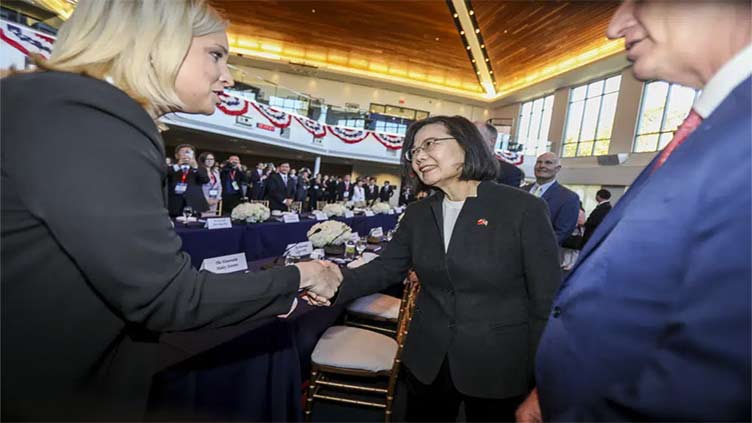China sanctions Reagan library, others over Tsai's US trip

World
US-Chinese relations have sunk to their lowest in decades due to disputes over the status of Taiwan.
TAIPEI, Taiwan (AP) — China retaliated for the United States House speaker’s meeting with the Taiwanese president by announcing sanctions on Friday against the Ronald Reagan Presidential Library and other organisations, adding to strains over the self-ruled island democracy Beijing claims as part of its territory.
Republican House Speaker Kevin McCarthy held talks Wednesday with President Tsai Ing-wen at the Reagan library in Simi Valley, California, in defiance of Chinese warnings. McCarthy joined a growing series of foreign legislators who have met Tsai in a show of support for Taiwan in the face of Chinese intimidation.
US-Chinese relations have sunk to their lowest level in decades due to disputes over the status of Taiwan, which split with China in 1949 after a civil war, as well as security, technology and Beijing’s treatment of Hong Kong and Muslim ethnic minorities.
The mainland’s ruling Communist Party says Taiwan is obliged to reunite with China, by force if necessary, and has no right to conduct foreign relations. President Xi Jinping’s government says contact with foreign officials will encourage Taiwanese who want formal independence, a step Beijing says would lead to war.
China’s Ministry of Foreign Affairs announced the Reagan library and the Hudson Institute, a Washington think tank, were sanctioned for “providing a platform and convenience to Taiwan separatist activities.” It said Chinese institutions were prohibited from having any cooperation or contact with them.
An email seeking comment from the library wasn’t immediately answered Thursday night.
Tsai accepted a leadership award from the Hudson Institute as part of her US trip and gave a speech about Taiwan’s challenges in regional security.
The ministry also cited Sarah May Stern, chair of the Hudson Institute board of directors; John P. Walters, the institute’s director; John Heubusch, former executive director of the Reagan Foundation, and Joanne M. Drake, the foundation’s chief administrator.
The ministry said they were barred from visiting China and any property or financial assets belonging to them in China would be frozen.
“We will take resolute measures to punish the ‘Taiwan independence’ separatist forces and their actions, and resolutely safeguard our country’s sovereignty and territorial integrity,” the Chinese Cabinet’s Taiwan Affairs Office said in a statement on Thursday.
The United States government has no official relations with Taiwan but maintains extensive informal and commercial ties. Washington is required by federal law to ensure the island has the means to defend itself if attacked by China.
Xi’s government has stepped up efforts to intimidate Taiwan by flying fighter jets and firing missiles into the sear nearby.
McCarthy’s predecessor as speaker, Nancy Pelosi, flew to Taiwan in August and met Tsai. Legislators from European parliaments also have visited the island.
In addition, two groups in Asia, the Prospect Foundation and the Council of Asian Liberals and Democrats, were sanctioned for their involvement in promoting Taiwan independence “under the guise of academic and research exchanges,” said Taiwan Affairs Office spokesperson Zhu Fenglian.
The Prospect Foundation is a Taiwanese think tank that works on dialogue and cooperation on issues related to Taiwan’s security, economy and social development. The Council of Asian Liberals and Democrats is a regional organization established in Thailand that promotes exchanges among liberal and democratic political parties in Asia. Taiwan’s Democratic Progressive Party is a member.
Separately, the Taiwan Affairs Office also announced further sanctions on Hsiao Bi-khim, Taiwan’s representative in the United States.
The ban on Hsiao does not appear to be substantively different from the ban enacted on her when Pelosi visited Taiwan. China had announced sanctions on a list of individuals from the DPP and ruling administration, including Hsiao. Then it banned the individuals, their family members and related organizations from traveling or operating in China, including Hong Kong. Friday’s announcement said any financial sponsors of Hsiao are also included.

